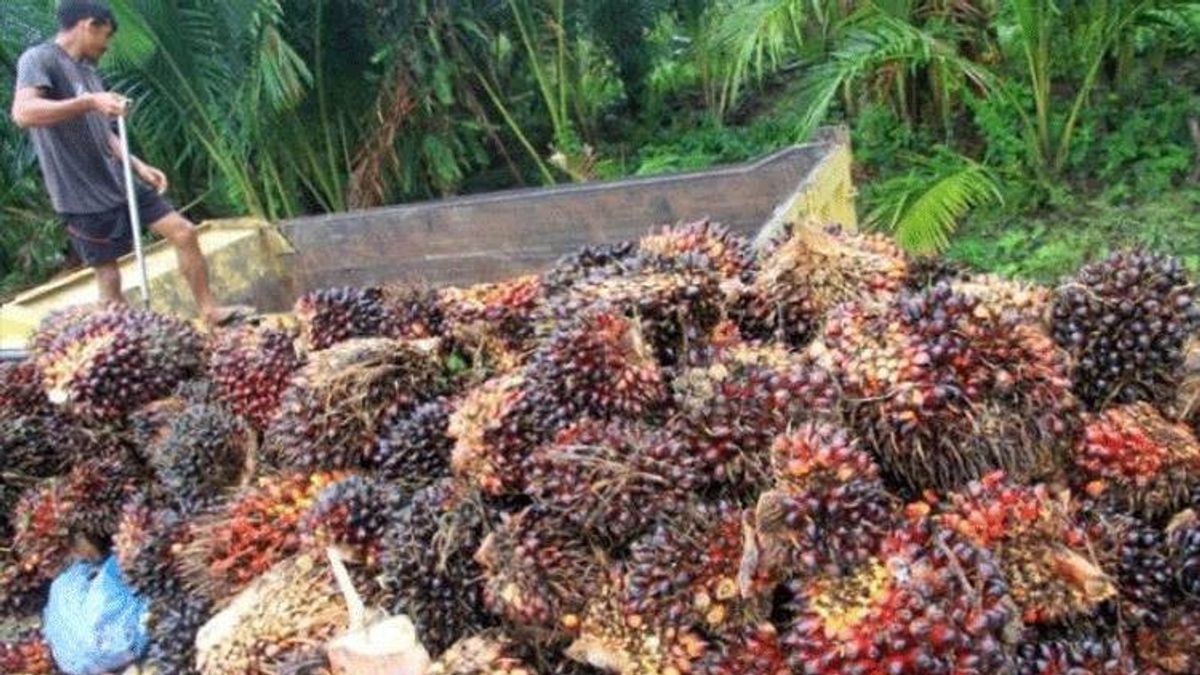JAKARTA - The Indonesian Palm Oil Farmers Association (Apkasindo) suspects that there is a game that is deliberately carried out by exporters to make the price of fresh fruit bunches or FFB farmers continue to be depressed.
The game in question is deliberately making the issue of crude palm oil (CPO) exports not smooth.
The general chairman of Apkasindo, Gulat Manurung, said that this was only an excuse for entrepreneurs to reduce the price of palm FFB at the farmer level.
This is because, in fact, CPO exports are currently increasing.
"Frames are made, exports haven't started, exports haven't started yet. This is a massive way for those who want to buy our FFB cheaply," he said on a CNBC program, Monday, July 25.
As is known, the CPO export ban began on April 28, 2022 and was lifted as of May 23, 2022.
Gulat acknowledged that exports of CPO and its derivatives in April reached 2.58 million tons, down 20 percent on an annual basis (yoy) compared to the same period last year.
Then into May, exports continued even though they were small at 1.01 million tons, down 67 percent yoy. However, in June, exports again increased to 2.91 million tons, up 28 percent yoy.
"What does it mean, exports are smooth, not really bad, but the frame that was built is a frame to make us oil palm farmers always experience a decline in price. How, in theory, the exporter will say exports are not smooth," he said.
Gulat suspects that the exporters deliberately conveyed that exports were not smooth as a result the CPO processing plant would respond by suppressing the FFB price at the farmer level so that the selling price of CPO could also be suppressed.
Furthermore, Gulat explained, the price of CPO had touched Rp. 8,000 per kg from the international average price of around Rp. 15,000 per kg, at that price, FFB farmers were only offered for Rp. 1,100 per kg.
"All of this has a systemic impact. So I really, really regret it when this information is fried. Exports are not going well, but this data shows that exports are running, so I call this a game," he explained.
Wrestling said, the suspicion of this game was corroborated by other factors. After the government removed the palm oil export levy of 200 US dollars per tonne, in fact, the price of CPO and FFB from farmers remained unchanged.
Based on Apkasindo's calculations, the abolition of export levies or PE should have an impact on increasing the price of CPO by Rp. 3,000 per kg and FFB by Rp. 1,000 per kg.
However, in fact, the price of FFB only increased by IDR 250 per kg, while CPO remained in the range of IDR 9,000 per kg.
"Our FFB price today should be IDR 2,450 if we calculate how much it is deducted from the PE burden. But why have we received only IDR 1,000 - IDR 1,250 until today, half of what it should have been. That's what the frame was made of, exports haven't started yet. This is a massive way for those who want to buy our FFB cheaply," he said.
Meanwhile, Acting Chairman of the Indonesian Palm Oil Board (DMSI) and Executive Director of the Indonesian Vegetable Oil Industry Association (GIMNI) Sahat Sinaga said that currently business players are still having difficulty exporting.
"Our first half of 2022 is 38 percent short below our export plan. How come he said thousands from where? Our people, as well as business players, are still having difficulties getting PE (export approval)," he said.
Therefore, Sahat suggested that the domestic market obligation (DMO) policy be immediately revoked so that exports can run smoothly. Especially now is the peak season of palm oil production.
"For the acceleration of exports, I really support what the Minister (Trade) said, eliminate the DMO. For coal, maybe it can work because there is only one player, PLN. If this is hundreds of players, "he explained.
The English, Chinese, Japanese, Arabic, and French versions are automatically generated by the AI. So there may still be inaccuracies in translating, please always see Indonesian as our main language. (system supported by DigitalSiber.id)












